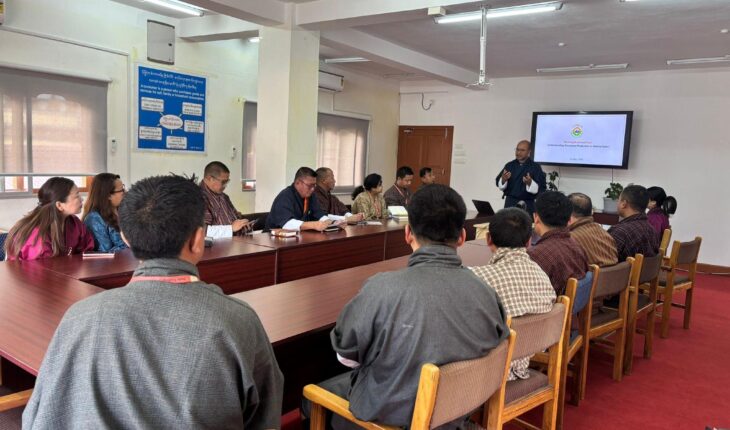
The partnership aims to improve consumer protection through fairer terms and conditions
CHONEY ZANGMO
Thimphu
In a move aimed at strengthening consumer rights and improving trust in the automobile market, the Competition and Consumer Affairs Authority (CCAA) has initiated a strategic collaboration with vehicle dealers across the country.
The initiative focuses on introducing clearer, more equitable terms and conditions (T&Cs) in vehicle transactions, marking a critical step forward in consumer protection and fair market practices.
The automobile sector has consistently been among the top sources of consumer complaints registered with the CCAA. Common grievances include excessive delays in vehicle delivery, and unjustifiably high booking advances.
Delivery of defective or substandard vehicles, inadequate after-sales support, and discrepancies between advertised and delivered vehicle specifications were also noted.
Adding to the plight, these issues are frequently exacerbated by the lack of transparent and comprehensive contractual agreements between dealers and buyers.
Recognizing the pressing need for reform, the CCAA recently conducted an in-depth study on the state of T&Cs across the automobile industry in Bhutan.
The findings revealed widespread inconsistencies and gaps in the contractual obligations of dealerships, often leaving consumers vulnerable and without clear avenues for redress
In response to these findings, the CCAA convened a high-level consultative session in Thimphu earlier this week. The session brought together representatives from more than 20 automobile dealerships operating in Bhutan.
The primary objective was to present the key findings of the CCAA’s study, discuss prevalent challenges in the industry, and develop a strategic roadmap toward enhancing consumer protections.
The session was marked by open dialogue and constructive engagement between regulatory officials and dealership representatives. Discussions centered around embedding fundamental consumer rights and protections into dealership policies and agreements, particularly those that govern the sale and servicing of vehicles.
The CCAA proposed a framework for robust terms and conditions that includes core elements of transparency and clarity in vehicle specifications and commitments made at the time of sale.
Others include fairness in contractual obligations, ensuring both parties understand and agree to reasonable terms, quality assurance and after-sales support, with clearly defined service timelines and responsibilities.
Further, issues like clear financial disclosures, including booking amounts, final payment structures, and financing options, defined cancellation and refund policies, and effective dispute resolution mechanisms were also included.
The initiative was met with strong support from the participating dealers, many of whom acknowledged the urgent need for standardization and improved clarity in the T&Cs they offer customers.
Dealers expressed readiness to revisit and update their contracts, recognizing the dual benefits of safeguarding consumers and shielding businesses from unwarranted complaints and litigation.
“Clear and fair T&Cs can build trust with customers and prevent unnecessary misunderstandings. It also protects us as service providers by defining mutual expectations,” said a representative from one of the country’s leading dealerships.
Another dealer noted that well-drafted contracts enhance the brand’s credibility and foster long-term relationships with customers, something increasingly critical in a competitive and reputation-driven market.
This collaboration is part of CCAA’s broader mandate to uphold and advance consumer rights in Bhutan. Established to ensure fair competition and equitable trade practices, the Authority has been at the forefront of identifying and addressing market imbalances that disadvantage consumers.
According to CCAA officials, a significant portion of the disputes brought before them involve vague, ambiguous, or one-sided contracts. Such agreements often lack clarity on timelines, penalties for delays, refund conditions, and customer rights—elements that are essential in high-value purchases like vehicles.
“Consumers deserve to know exactly what they are paying for, when they will receive it, and what recourse is available if things go wrong,” said a CCAA spokesperson. “Our goal is to make these rights standard, not exceptional.”
The Authority emphasized that stronger T&Cs would not only improve consumer satisfaction but would also serve as a shield for businesses from frivolous claims, thereby promoting a healthier commercial environment.
Buoyed by the positive outcome of the consultative session with automobile dealers, the CCAA is now planning to expand similar initiatives to other sectors, particularly those with high consumer engagement such as electronics, housing, and tourism services.
Each sector will be approached based on its unique challenges, but the foundational principles will remain the same: clarity, fairness, accountability, and protection of consumer rights.
CCAA’s long-term vision includes developing model contracts and templates that businesses can adopt or adapt to their operations. These model documents would reflect best practices and be periodically updated to keep pace with market developments and evolving legal standards
Experts believe that such reforms are timely, especially as Bhutan’s market continues to grow and diversify. With increasing consumer awareness and digital connectivity, there is rising demand for more transparent and accountable business practices.
The automobile sector, given the significant investment it requires from consumers, serves as a logical starting point. Vehicles are not only high-cost items but also vital to daily life, meaning that unresolved complaints can have a serious impact on consumer well-being.
Moreover, standardized and fair T&Cs can help elevate Bhutan’s overall ease of doing business ranking and attractiveness to foreign investment. Businesses that operate within well-regulated, transparent systems tend to be more efficient and enjoy greater consumer loyalty.
The CCAA has committed to continuing its engagement with stakeholders to monitor progress, provide technical guidance, and track the implementation of revised T&Cs in the automotive sector.
Follow-up reviews and consumer feedback mechanisms are also being planned to ensure that changes on paper translate into real-world impact.
For consumers, this initiative represents a promising development in their ongoing quest for fair treatment and accountability.





